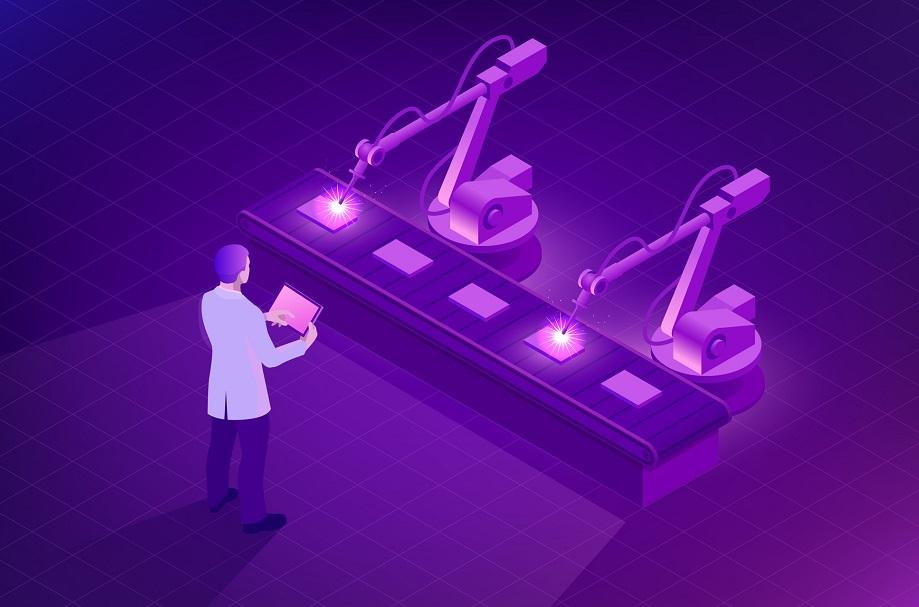President
- FMA
- The Fabricator
- FABTECH
- Canadian Metalworking
Categories
- Additive Manufacturing
- Aluminum Welding
- Arc Welding
- Assembly and Joining
- Automation and Robotics
- Bending and Forming
- Consumables
- Cutting and Weld Prep
- Electric Vehicles
- En Español
- Finishing
- Hydroforming
- Laser Cutting
- Laser Welding
- Machining
- Manufacturing Software
- Materials Handling
- Metals/Materials
- Oxyfuel Cutting
- Plasma Cutting
- Power Tools
- Punching and Other Holemaking
- Roll Forming
- Safety
- Sawing
- Shearing
- Shop Management
- Testing and Measuring
- Tube and Pipe Fabrication
- Tube and Pipe Production
- Waterjet Cutting
Industry Directory
Webcasts
Podcasts
FAB 40
Advertise
Subscribe
Account Login
Search
Big data, like exercise equipment, only offers value when put to use
Implementing IIoT technology in manufacturing operations will increase the volume, velocity, and variety of data
- By Bill Frahm
- April 1, 2019
- Article
- Automation and Robotics
Fortunately, big data is a term that means what it says. It really is a large volume of data, captured at high velocity and having a lot of variety.
Unfortunately, big data is very much like exercise equipment. The only real benefit comes from the type and quality of work you put into it.
Implementing networking and monitoring technologies, like the industrial internet of things (IIoT), will certainly increase the volume, velocity, and variety of your data. Your ability to benefit from your data is directly related to your knowledge of materials and technologies, your capabilities in statistical analysis, and your commitment to learn.
We’ve all seen the commercials for home exercise equipment. The promotions involve attractive 20-somethings using a trainer in the living room of their 40th floor luxury apartment overlooking a twilight cityscape.
The reality is quite different. In fact, exercise equipment is big and ugly. We put it in our basements. Another fact is that getting real, measurable benefit from our equipment is hard and tedious work. Productive exercise, weight loss, and muscle development come from many hours of commitment, sweat, and proper technique. The risks of inadequate use include continued lack of fitness, lost investment, and injury.
The same is true with big data. The real value of collected data comes from understanding its context and discovering patterns, trends, and relationships. If you want to do a competent job using your data, you need to understand your operations, material behaviors, equipment behaviors, failures modes, failure effects, and the data these events and processes generate.
Finding the value in your data requires specialized knowledge about how to analyze datasets and confirm your results. The risk of approaching your data analysis blindly is that you will make poor decisions based on bad assumptions. This can lead to poor production and maintenance results, lost investment, and employee injury.
Data Science
If you’re contemplating a project to implement IIoT, you are either entering or expanding your exposure to data science. Data science incorporates several disciplines to explore data, discover new patterns and relationships, challenge and confirm assumptions, and deploy machine learning algorithms. These responsibilities fall on the disciplines of data analysts, statistical specialists, and machine learning specialists.
Data analysts tend to be freewheeling, creative types. Your analyst should understand your operations, along with the materials, technologies, and processes you use. He should be able to see and respond to issues and opportunities. Given a set of coding tools, your analyst can begin exploring your data based on the context of your operations and intuition about potential sources for problems or opportunities. He will use his toolset to develop preliminary analyses of your data to find potential problems or opportunities for improvement.
Statistical specialists know how to use rigorous statistical approaches to challenge assumptions offered by analysts and management. A statistical specialist is the employee who will temper your enthusiasm until reasonably certain that your assumptions are supported by the math. He will remind you that correlation doesn’t necessarily reflect causation. Statistical specialists are your best line of defense against hasty and costly decisions without adequate evidence.
Machine learning specialists are programmers who tell your smart devices how to respond to inputs. Machine learning has several requirements:
- Data must be properly categorized and captured.
- Staff must be skilled at developing the right operations and calculations to respond accurately and productively to inputs without risking product quality, production reliability, and employee safety.
- Processes being changed are repeatable with consistently reliable results.
- Processes can be scaled to the size of the operation.
- Processes can synthesize solutions to several different but related models.
A machine learning specialist programs equipment to respond to data and events and adjust its behaviors as it “learns.” He requires deep knowledge of your manufacturing operation and the outputs and consequences of machine behaviors. The scope and type of machine learning should be defined by accurate and precise direction from data and statistical analysts and bounded by production and safety requirements.
Planning for Big Data
When implementing your IIoT project, you must design manageability and efficiency into your data collection. Intelligent data capture means you must focus on capturing only meaningful events, structure your data to support the integrity of your analysis, and protect your data from intrusion and noise. Not only will managers make decisions from your captured data, increasingly autonomous machinery will demand integrity to support operations and prevent employee injuries.
Probably one of your biggest challenges will be to prevent noise in your data capture. As your operation progresses, you will need to adjust the type and frequency of data capture to prevent the capture of unnecessary information. And you will have to design your network to prevent noise and crosstalk on your wired and wireless communications. As your volume of network communication increases, your risk to the integrity of your data also will increase. It will become critically important to maintain the integrity of your signals.
IIoT offers great opportunity to dive deeper into your manufacturing operation and learn new insights into relationships and process events. Managing critically important risks is key to making the right decisions. Your greatest defenses against bad decisions are knowledge of your data capabilities and limitations, sound analytical procedures, and a well-designed and secured system for data collection.
About the Author

Bill Frahm
P.O. Box 71191
Rochester Hills, MI 48307
248-506-5873
subscribe now

The Fabricator is North America's leading magazine for the metal forming and fabricating industry. The magazine delivers the news, technical articles, and case histories that enable fabricators to do their jobs more efficiently. The Fabricator has served the industry since 1970.
start your free subscription- Stay connected from anywhere

Easily access valuable industry resources now with full access to the digital edition of The Fabricator.

Easily access valuable industry resources now with full access to the digital edition of The Welder.

Easily access valuable industry resources now with full access to the digital edition of The Tube and Pipe Journal.
- Podcasting
- Podcast:
- The Fabricator Podcast
- Published:
- 04/16/2024
- Running Time:
- 63:29
In this episode of The Fabricator Podcast, Caleb Chamberlain, co-founder and CEO of OSH Cut, discusses his company’s...
- Trending Articles
Tips for creating sheet metal tubes with perforations

JM Steel triples capacity for solar energy projects at Pennsylvania facility

Are two heads better than one in fiber laser cutting?

Supporting the metal fabricating industry through FMA

Omco Solar opens second Alabama manufacturing facility

- Industry Events
16th Annual Safety Conference
- April 30 - May 1, 2024
- Elgin,
Pipe and Tube Conference
- May 21 - 22, 2024
- Omaha, NE
World-Class Roll Forming Workshop
- June 5 - 6, 2024
- Louisville, KY
Advanced Laser Application Workshop
- June 25 - 27, 2024
- Novi, MI



























